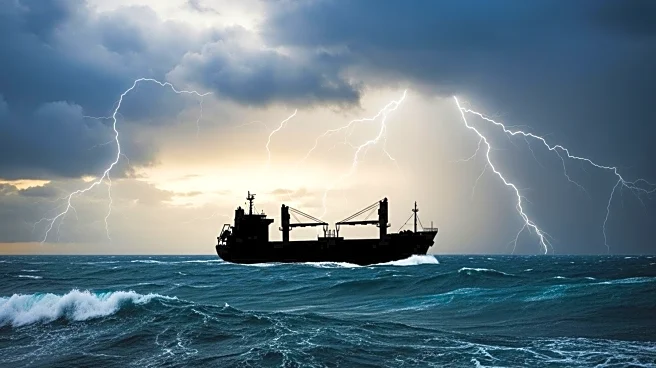What's Happening?
The Trump administration has announced its opposition to a United Nations marine fuel emissions-cutting agreement, warning countries that support the deal of potential tariffs, visa restrictions, and port levies. The draft agreement, established through the International Maritime Organization (IMO), aims to impose fees on ships that exceed global carbon emissions standards. The U.S. withdrew from the talks in April and has since communicated its intent to retaliate against countries endorsing the accord. The administration argues that the measures would impose unnecessary burdens on the shipping industry without significantly reducing emissions. The U.S. State Department has reached out to other IMO member countries, cautioning them against adopting the Net-Zero Framework, which is set for a vote in the upcoming IMO extraordinary session in October.
Why It's Important?
The Trump administration's stance on the IMO agreement highlights the ongoing tension between economic interests and environmental regulations. By threatening tariffs and other retaliatory measures, the U.S. seeks to protect its shipping industry from what it perceives as onerous international standards. This move could impact global trade dynamics, as shipping accounts for nearly 3% of the world's CO2 emissions and is crucial for international commerce. The administration's actions may influence other countries' decisions regarding the framework, potentially affecting the global effort to decarbonize the shipping industry. The outcome of this dispute could have significant implications for international environmental policy and trade relations.
What's Next?
The IMO's extraordinary session in October will be a critical juncture for the Net-Zero Framework. If the framework is adopted, countries supporting it may face U.S. retaliatory measures, which could lead to diplomatic tensions and affect international trade. The U.S. is actively engaging with its allies to encourage similar opposition to the framework, which may result in a coalition against the IMO agreement. The Dutch government has already received warnings from the U.S., indicating potential tariffs if it supports the framework. The upcoming session will provide a platform for member states to address concerns and potentially reshape the agreement before adoption.









